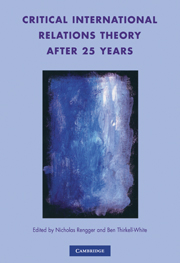Book contents
- Frontmatter
- Contents
- Preface
- Notes on contributors
- Editors' Introduction
- Looking back from somewhere: reflections on what remains ‘critical’ in critical theory
- Transnational theories of order and change: heterodoxy in International Relations scholarship
- Happy Anniversary! Time and critique in International Relations theory
- Is critical theory always for the White West and for Western imperialism? Beyond Westphilian towards a post-racist critical IR
- The promise of critical IR, partially kept
- Towards a sociology of global morals with an ‘emancipatory intent’
- Between Kant and Pufendorf: humanitarian intervention, statist anti-cosmopolitanism and critical international theory
- Index
Towards a sociology of global morals with an ‘emancipatory intent’
Published online by Cambridge University Press: 06 July 2010
- Frontmatter
- Contents
- Preface
- Notes on contributors
- Editors' Introduction
- Looking back from somewhere: reflections on what remains ‘critical’ in critical theory
- Transnational theories of order and change: heterodoxy in International Relations scholarship
- Happy Anniversary! Time and critique in International Relations theory
- Is critical theory always for the White West and for Western imperialism? Beyond Westphilian towards a post-racist critical IR
- The promise of critical IR, partially kept
- Towards a sociology of global morals with an ‘emancipatory intent’
- Between Kant and Pufendorf: humanitarian intervention, statist anti-cosmopolitanism and critical international theory
- Index
Summary
Abstract. First generation Frankfurt School critical theorists argued that global solidarity was possible because human beings have similar vulnerabilities to mental and physical suffering. This approach to solidarity remains significant for any discussion of the ethical aspirations of critical theory. It also has ramifications for efforts to develop a sociological approach to global moral codes which is influenced by the idea of an emancipatory social theory. Informed by certain themes which were developed by Simone Weil, this article draws on the writings of Fromm, Horkheimer, Adorno and Elias to consider how a sociology of international moral codes can be developed. One of the aims of this project is to consider how far global moralities have developed forms of solidarity around the recognition of shared vulnerabilities to mental and physical suffering which are part of the species' biological legacy.
Numerous thinkers have denied that the idea of shared humanity can provide the philosophical foundations for a cosmopolitan ethic, and many have rejected the belief that appeals to humanity will ever compete with the emotional attachments and the established norms of specific communities in determining human conduct. But the idea that common humanity has profound ethical significance is not entirely friendless in recent moral and political theory. Gaita has drawn on Simone Weil's writings to defend an ethic of human concerns which is, in some respects, more fundamental than the social moralities which usually shape individual and group behaviour. The central aim of this article is to link this idea with the notion of a sociology of global morals with an emancipatory intent.
- Type
- Chapter
- Information
- Critical International Relations Theory after 25 Years , pp. 135 - 150Publisher: Cambridge University PressPrint publication year: 2007
- 1
- Cited by

